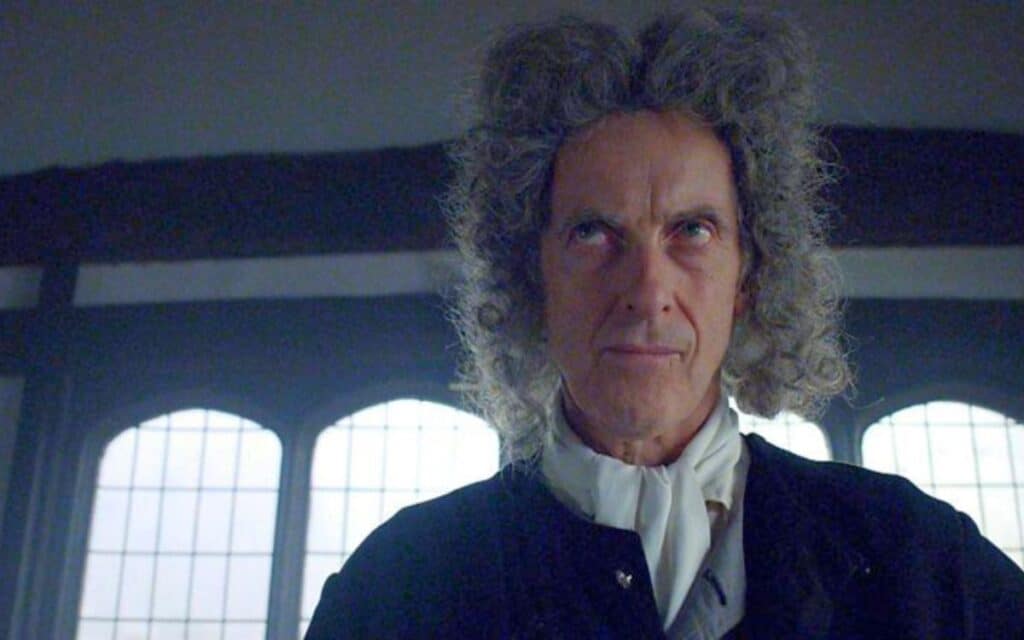Martin’s Close 2019 is a pleasantly spooky addition to A Ghost Story for Christmas, writes RICHARD MARKWORTH

TITLE: Martin’s Close
RELEASE DATE: 24 December 2019 on BBC Four
DIRECTOR: Mark Gatiss
CAST: Peter Capaldi, Elliot Levey, Wilf Scolding, Sara Crowe, James Holmes, Jessica Temple, Simon Williams, Fisayo Akinade, Ian Hallard
2019 saw Mark Gatiss return to A Ghost Story for Christmas to helm his third entry in the seasonal series of spooky stories.
After producing an original work, The Dead Room (2018), for his previous yuletide offering, Gatiss chose to revisit the strand’s familiar wellspring of M R James’ works for his inspiration. The result was a dramatisation of the author’s Martin’s Close.
Once the opening titles, presented against calming images of sunlight-dappled trees and a tranquil, if murky-looking, pond are over, Gatiss wastes no time in getting down to business.
The action commences in a dingy 17th century gaol cell where the incarcerated John Martin (Wilf Scolding) is tortured by the sound of a tune hummed by a seemingly disembodied female voice which he desperately implores to “Leave me be!”. We next move to a courtroom presided over by the infamous “hanging judge” George Jeffreys (Elliot Levy) where it is made clear Martin is the defendant, accused of the murder of one Ann Clark (Jessica Temple).
Without warning, or indeed introduction, we are transported to the present day where a narrator, Stanton (Simon Williams), sips madeira by a roaring fire and informs us he has acquired a transcript of the trial. We are therefore led to assume it is Stanton himself who is relating the unusual facts of the case to the audience via the onscreen drama, despite the viewer having no previous knowledge of the character’s existence. The 17th Century narrative is interspersed with Stanton’s 21st Century addresses to camera periodically from this point onwards.
Following this mildly confusing change of scene, the action returns to the courtroom of 1684 where King’s Counsel, Dolben (Peter Capaldi), seeks to prove Martin, a man of “good stock”, slit the throat of “innocent” Ann before disposing of the unfortunate girl’s corpse in a local pond.
As the case unwinds, we learn Martin callously toyed with the affections of Ann, a simple-minded soul whom we would nowadays classify as having learning difficulties, for his own twisted amusement. However, his distasteful japes are soon curtailed when his fiancée, a young lady possessing a substantial dowry, hears rumour of his dalliance and promptly calls off the betrothal. Ann mysteriously vanishes shortly thereafter.
It is widely assumed by the locals, Martin has done away with the girl but, strangely, there are instances where she is apparently spotted after the date of her alleged homicide and Martin himself appears bedevilled by the sound of Ann’s voice humming the tune of the very song which he had used to cruelly woo her.
What is more, the defendant is troubled by the appearance of a dark, enigmatic figure lurking in the courtroom and the inexplicable existence of a “13th juror” who nobody else attending the trial seems to have noticed. As Martin struggles to evade the noose, is he being tormented by his own guilt or is the spectre of Ann dogging his steps?
Martin’s Close is not a particularly weighty tale and it is rather obvious how it will end. Furthermore, Martin himself is such a blatant cad, it is a challenge to dredge up any sympathy for the character and the fact his peril is evidently well-deserved does lessen the dramatic impact of the piece.
However, it is nonetheless an enjoyable adaptation and Gatiss’ able direction keeps proceedings rattling along at a healthily brisk pace, ensuring the audience’s attention is held throughout.
The director, once again, proves he is adept at creating some deliciously creepy moments. One scene, which sees a terrified Martin cower inside the local Inn in the belief Ann’s shade has finally tracked him down, will particularly please the palates of ghost story connoisseurs.
The sudden appearance of the modern day narrator once the drama has already commenced is slightly jarring and the episode would perhaps have been better served if the story had opened with him. However, Simon Williams has such an engaging presence, this proves a minor issue.
The entire cast perform commendably even if Levy’s jocular, and somewhat camp, Judge Jeffreys did unfortunately put me in mind of Laurence Llewelyn-Bowen on occasion. Thankfully, Peter Capaldi as the grave Dolben, brings his usual high standard of performance to the affair and his sober presence successfully counteracts any threat the production may have had of sliding too far into the realms of overt humour.
Martin’s Close, while never genuinely blood-curdling, is a definite improvement on Gatiss’ somewhat underwhelming The Dead Room from the previous year and should prove a pleasantly spooky treat for anyone who enjoys a helping of supernatural suspense with their festive tipple. Madeira anyone?
Tell us your thoughts on Martin’s Close 2019 in the comment section below!







